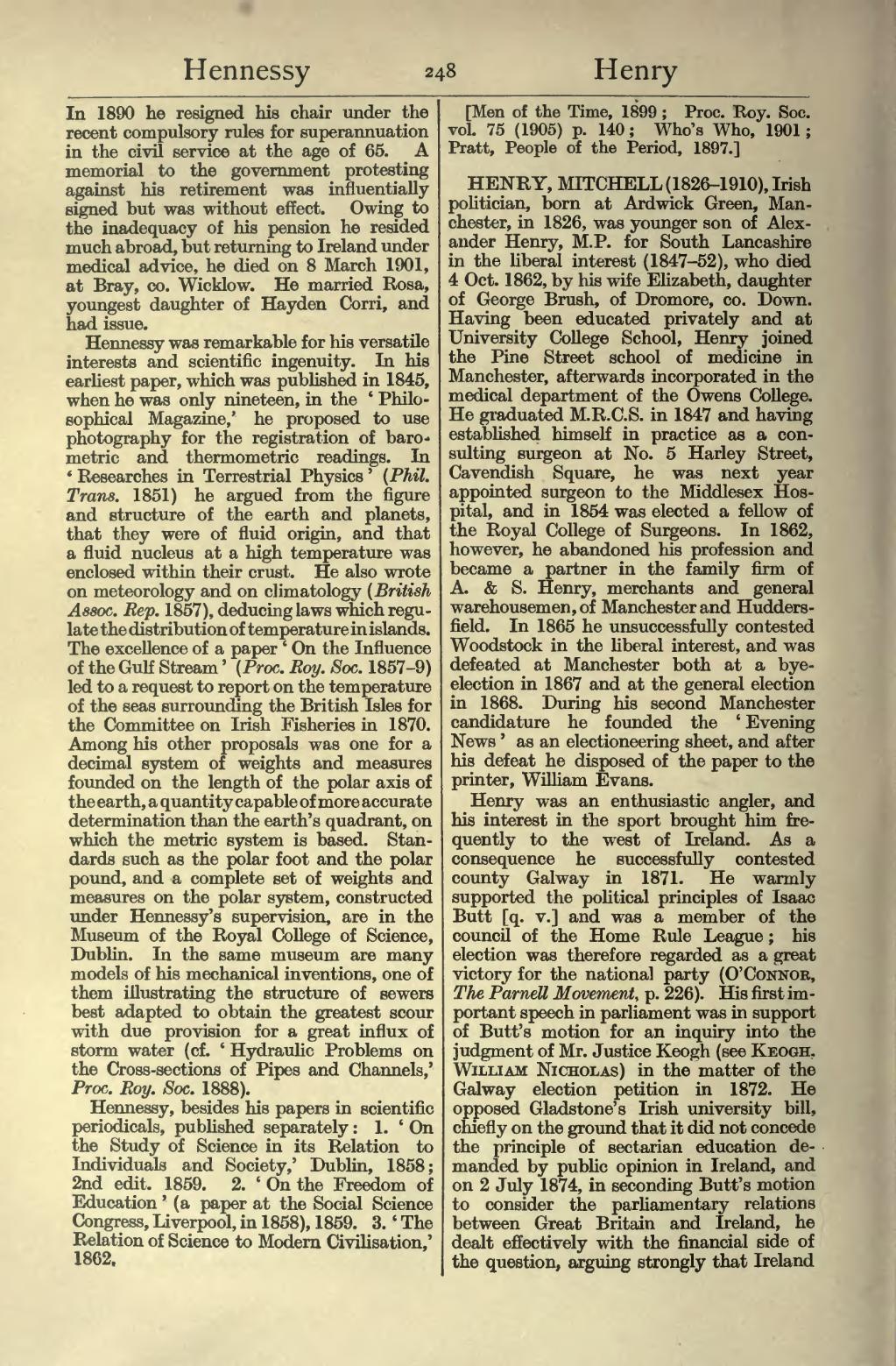In 1890 he resigned his chair under the recent compulsory rules for superannuation in the civil service at the age of 65. A memorial to the government protesting against his retirement was influentially signed but was without effect. Owing to the inadequacy of his pension he resided much abroad, but returning to Ireland under medical advice, he died on 8 March 1901, at Bray, co. Wicklow. He married Rosa, youngest daughter of Hayden Corri, and had issue.
Hennessy was remarkable for his versatile interests and scientific ingenuity. In his earliest paper, which was published in 1845, when he was only nineteen, in the 'Philosophical Magazine,' he proposed to use photography for the registration of barometric and thermometric readings. In 'Researches in Terrestrial Physics' (Phil. Trans. 1851) he argued from the figure and structure of the earth and planets, that they were of fluid origin, and that a fluid nucleus at a high temperature was enclosed within their crust. He also wrote on meteorology and on climatology (British Assoc. Rep. 1857), deducing laws which regulate the distribution of temperature in islands. The excellence of a paper 'On the Influence of the Gulf Stream' (Proc. Roy. Soc. 1857-9) led to a request to report on the temperature of the seas surrounding the British Isles for the Committee on Irish Fisheries in 1870. Among his other proposals was one for a decimal system of weights and measures founded on the length of the polar axis of the earth, a quantity capable of more accurate determination than the earth's quadrant, on which the metric system is based. Standards such as the polar foot and the polar pound, and a complete set of weights and measures on the polar system, constructed under Hennessy's supervision, are in the Museum of the Royal College of Science, Dublin. In the same museum are many models of his mechanical inventions, one of them illustrating the structure of sewers best adapted to obtain the greatest scour with due provision for a great influx of storm water (cf. 'Hydraulic Problems on the Cross-sections of Pipes and Channels,' Proc. Roy. Soc. 1888).
Hennessy, besides his papers in scientific periodicals, published separately: 1. 'On the Study of Science in its Relation to Individuals and Society,' Dublin, 1858; 2nd edit. 1859. 2. 'On the Freedom of Education' (a paper at the Social Science Congress, Liverpool, in 1858), 1859. 3. 'The Relation of Science to Modern Civilisation,' 1862.
[Men of the Time, 1899; Proc. Roy. Soc. vol. 75 (1905) p. 140; Who's Who, 1901; Pratt, People of the Period, 1897.]
HENRY, MITCHELL (1826–1910), Irish politician, born at Ardwick Green, Manchester, in 1826, was younger son of Alexander Henry, M.P. for South Lancashire in the liberal interest (1847–52), who died 4 Oct. 1862, by his wife Elizabeth, daughter of George Brush, of Dromore, co. Down. Having been educated privately and at University College School, Henry joined the Pine Street school of medicine in Manchester, afterwards incorporated in the medical department of the Owens College. He graduated M.R.C.S. in 1847 and having established himself in practice as a consulting surgeon at No. 5 Harley Street, Cavendish Square, he was next year appointed surgeon to the Middlesex Hospital, and in 1854 was elected a fellow of the Royal College of Surgeons. In 1862, however, he abandoned his profession and became a partner in the family firm of A. & S. Henry, merchants and general warehousemen, of Manchester and Huddersfield. In 1865 he unsuccessfully contested Woodstock in the liberal interest, and was defeated at Manchester both at a bye-election in 1867 and at the general election in 1868. During his second Manchester candidature he founded the 'Evening News ' as an electioneering sheet, and after his defeat he disposed of the paper to the printer, William Evans.
Henry was an enthusiastic angler, and his interest in the sport brought him frequently to the west of Ireland. As a consequence he successfully contested county Galway in 1871. He warmly supported the political principles of Isaac Butt [q. v.] and was a member of the council of the Home Rule League; his election was therefore regarded as a great victory for the national party (O'Connor, The Parnell Movement, p. 226). His first important speech in parliament was in support of Butt's motion for an inquiry into the judgment of Mr. Justice Keogh (see Keogh, William Nicholas) in the matter of the Galway election petition in 1872. He opposed Gladstone's Irish university bill, chiefly on the ground that it did not concede the principle of sectarian education demanded by public opinion in Ireland, and on 2 July 1874, in seconding Butt's motion to consider the parliamentary relations between Great Britain and Ireland, he dealt effectively with the financial side of the question, arguing strongly that Ireland
